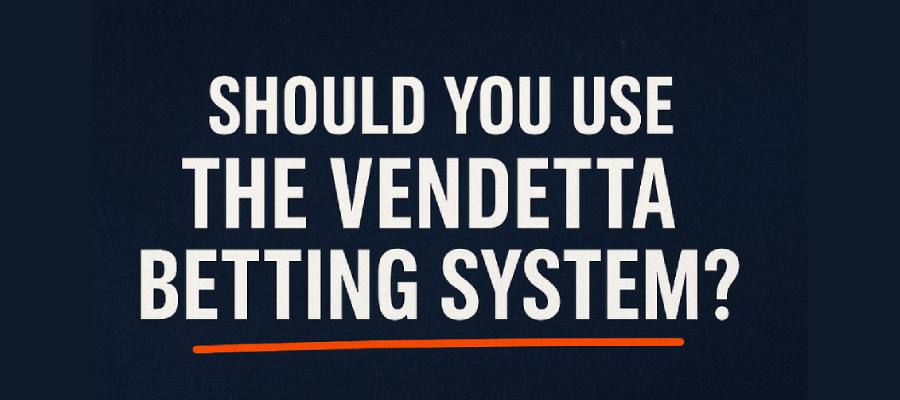The Vendetta Betting System is one of the oldest progressive chase methods in sports betting — but modern markets expose its flaws quickly.
What once looked like an easy “pick a team and recover losses” strategy now collapses under sharp lines, fast-moving odds, and today’s volatility.
This guide breaks down how the system actually works, why it resurfaced, and the modern alternatives bettors use instead of outdated chase models.
Table of Contents
- What Exactly Is the Vendetta Betting System?
- How the Vendetta Betting System Works (Step-by-Step)
- Why the Vendetta Betting System Spiked Again
- Does the Vendetta System Actually Work Today?
- Should You Use the Vendetta System in NFL, NCAAF, NBA, or MLB?
- Modern Alternatives to the Vendetta Betting System
- Where the Vendetta System Fails (Competitor Gaps)
- How to Use the Vendetta System Safely (If You Still Try It)
- Vendetta Betting System FAQs
- Is the Vendetta Betting System profitable long-term?
- How deep should bettors chase?
- Is this the same as a Martingale?
- Can you use this system for NFL props or parlays?
- Why do bettors still use outdated chase systems?
- Does it work better in college football?
- What bankroll size is recommended for chase systems?
- What are safer markets to test with?
- Legacy Perspective: When “Revenge Logic” Actually Worked
- Final Thoughts
- Betting Systems Guides | Learn Before You Wager
Vendetta Betting System: Quick Snapshot
Simple rules, dangerous execution.
Pick a team → increase stake after each loss → reset after a win.
Why it fails today:
• Exponential bankroll risk • Sharper sports betting lines • High-variance outcomes • No protection against long losing streaks
Modern markets move too fast for slow chase escalation.
What Exactly Is the Vendetta Betting System?
The Vendetta wagering strategy is a progressive chase system built on one idea: pick a side and stick with it until it wins.
It rose to popularity on early online betting forums where users tracked multi-game chases to “recover” losses.
Core mechanics:
- Pick one team or market.
- Increase stake after every loss.
- Reset to 1 unit after the first win.
While the rules seem simple, the system depends entirely on the sports betting line and exposes bankrolls to rapid compounding risk.
Historical Origins: The Old “Revenge” Version of the Vendetta System
The original vendetta or revenge betting system was based not on progressive wagering, but on the belief that a team’s motivation to “get even” after a loss created exploitable betting opportunities.
This early version circulated heavily before analytics became mainstream.
Different leagues produced different winning-percentage spectrums.
In professional football, the gap between elite and bottom-tier teams was wide — creating the idea that strong teams would bounce back aggressively after losses.
Basketball’s 82-game season tightened that spectrum, while Major League Baseball’s long schedule narrowed it further, typically keeping teams between 35% and 65% win rates.
The revenge system attempted to identify spots where emotional bounce-back would matter.
One classic example came from MLB betting: when a home team lost the previous day by three or more runs to the same opponent, bettors considered the next game a “reversal spot.”
The theory assumed embarrassment would spark a motivated performance — but only if the line also supported the bounce-back opportunity.
This early version of the Vendetta System relied heavily on matchup context, pitching rotations, and market pricing.
This formed the conceptual roots of the name long before modern chase methods evolved.
For bettors interested in analytical approaches to MLB performance rather than emotion-based systems, explore our guide on profitable MLB underdog systems based on long-term data.
↑ TopHow the Vendetta Betting System Works (Step-by-Step)
Step #1 — Pick Your Target Team or Market
Most bettors using the system today apply it in betting NFL markets because schedules are predictable and line movement is easy to follow.
Step #2 — Increase Your Stake After Every Loss
This is the “chase” component.
A typical sequence looks like:
1u → 2u → 4u → 8u
The logic: when your chosen side finally wins, you recover everything plus a small profit.
Step #3 — Reset After the First Win
Once the catch-up win hits, you reset to your base unit and start over — but the volatility remains extremely high.
↑ TopExample of the Vendetta System in Action
Here’s a clean NCAAF example using a three-game chase on a single team:
- Game 1: 1u at -140 → Loss
- Game 2: 2u at -125 → Loss
- Game 3: 4u at +110 → Win
Because betting bookie odds fluctuate based on injuries, matchups, and market exposure, recovery depends heavily on timing and variance.
Football volatility — especially in college — makes this system extremely unstable.

Why the Vendetta Betting System Spiked Again
Searches surged recently after large TikTok accounts, Reddit threads, and archived betting forums resurfaced “old betting systems” during cold streak season.
Users typing “recover my losses” into a sportsbook login bar often get algorithm-fed chase methods.
Hot streaks and cold streaks don’t care about your bankroll — that’s the misunderstanding.
↑ TopDoes the Vendetta System Actually Work Today?
The Pros
- Simple rules
- Clear structure
- Can hit short-term recovery streaks
The Cons
- Requires massive bankroll
- One long skid wipes out everything
- Not suited for sharp markets
- Relies on outdated logic
Modern sports analytics outperform these revenge-style systems every time.
Sports betting line efficiency has improved too much for slow, predictable chase models.
↑ TopShould You Use the Vendetta System in NFL, NCAAF, NBA, or MLB?
Using this chase strategy in major leagues is risky because teams regularly lose three or more games in a row.
Even with strong nfl odds or softer bookie college football odds, variance destroys chase systems.
Sharp bettors now use situational angles, analytics, and line shopping instead of blind escalation.
If you’re looking for structured models designed specifically for football markets, review proven football betting systems that actually work in today’s analytical environment.
↑ TopModern Alternatives to the Vendetta Betting System
Flat Betting
Simple 1-unit plays let you evaluate actual skill without risking collapse.
Kelly Criterion (Fractional)
Bet sizing based on real expected value — not emotion or revenge logic.
To learn how to calculate optimal stake sizing and avoid runaway risk, see our complete guide on how to use the Kelly Criterion.
Situational Handicapping + Market Movement
Tracking injuries, coaching tendencies, rest patterns, and sharp movement produces far better results.
If you prefer pool-based wagering instead of fixed-odds markets, our guide to tote wagering systems explains how payouts adjust based on market share instead of static odds.
↑ TopWhere the Vendetta System Fails (Competitor Gaps)
Most articles skip the math. Here’s what matters:
- Bankroll math compounds exponentially.
- A 0–4 losing skid destroys small bankrolls.
- Elite teams still lose in clusters.
- Sportsbooks price modern markets too efficiently.
A four-step chase at -150 requires a total of 15 units risked to win one single unit.
That’s terrible risk-to-reward.
Why the Old Revenge-Based Version Also Failed
The classic vendetta system looked for emotional bounce-back in MLB or NBA rematches — but motivation alone rarely overpowered the line.
In baseball, bettors often targeted home teams that had been blown out the day before, assuming pride would spark a reversal.
But pitching matchups, hitting form, and market pricing dictated outcomes far more accurately than emotion ever could.
Rematch logic also proved inconsistent.
Teams like the Cleveland Guardians once beat the Texas Rangers eight straight times despite no major talent gap, showing that streaks can run in either direction with no reliable revenge value.
For a modern bounce-back model that actually uses historical playoff data, compare this with the NBA/NHL Zig-Zag Theory, one of the most studied reaction-based systems.
Ultimately, even the original revenge-focused version collapsed for the same reason the modern chase system does today: the line reflects objective reality, not emotion.
For a broader look at which historical wagering systems remain viable — and which collapse under modern odds — see our breakdown of wagering systems that work and don’t.
↑ TopHow to Use the Vendetta System Safely (If You Still Try It)
- Base Unit: 0.5% or less of bankroll
- Stop-Loss: End chase after 3–4 steps
- Avoid chasing heavy favorites
- Avoid revenge spots and emotional betting
- Prefer lower-variance props or totals
Vendetta Betting System FAQs
Is the Vendetta Betting System profitable long-term?
No. It collapses under modern sportsbook pricing.
How deep should bettors chase?
No more than three levels — and even that is dangerous.
Is this the same as a Martingale?
They’re related, but Vendetta chases a specific team instead of alternating outcomes.
Can you use this system for NFL props or parlays?
No — parlays increase volatility and magnify losses.
Why do bettors still use outdated chase systems?
Because they feel emotionally satisfying — not because they work.
Does it work better in college football?
No. Volatility and upsets make it worse.
What bankroll size is recommended for chase systems?
Large — usually 100+ units.
What are safer markets to test with?
Totals, alt spreads, or low-variance props.
Legacy Perspective: When “Revenge Logic” Actually Worked
In the earliest version of the Vendetta System, revenge angles sometimes aligned with objective data.
Particularly when the betting line, recent form, and situational matchups supported a motivated bounce-back.
When those factors lined up, bettors occasionally found value.
But when emotion conflicted with pitching matchups, travel, injury reports, or line movement, the revenge angle collapsed consistently.
This reinforces a modern truth:
systems based on emotion are unreliable, but systems supported by line analysis and analytics can occasionally produce edges.
Final Thoughts
Chase systems like Vendetta don’t survive in today’s sharp betting landscape.
Whether you experiment with it or stick to flat betting, the real edge comes from choosing a sportsbook with fast-moving lines, strong odds, and reliable market updates.
Create your sportsbook account at MyBookie today and access NFL odds, bookie college football odds, and customizable betting tools.
Bet Smarter with MyBookie
Ready to bet smarter? Use live odds, sharp lines, and market movement to elevate your strategy.
Browse Sports Betting LinesFast payouts, strong odds, and elite betting tools — only at MyBookie Sportsbook.
Betting Systems Guides | Learn Before You Wager
Explore more MyBookie betting system guides that break down proven strategies, line-based models, and the math behind what works — and what doesn’t — in modern sports betting.
- Contrarian Betting Strategy
- How to Use the Kelly Criterion
- Wagering Systems That Work — and Don’t
- Profitable Underdog Systems for Baseball
Sports Betting Lines Across All Sports
MyBookie Odds, Spreads, Totals & Props Updated Daily
Sports Betting Odds
Betting Online Casino
| Playing Blackjack or Poker |
| Understanding Live Casino |
| Best Casino Online Games |




